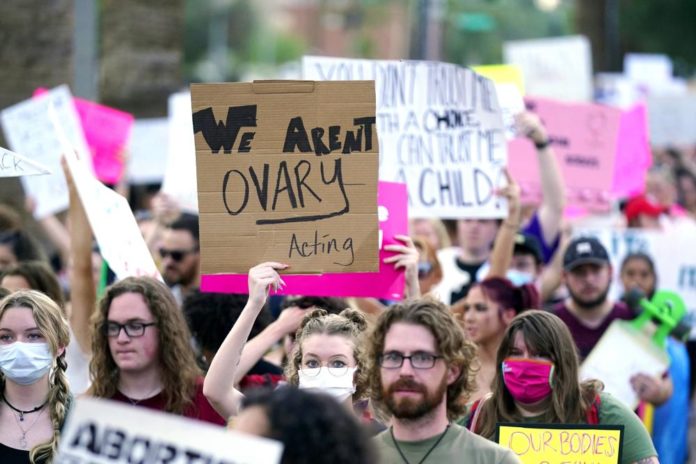
The leader of Arizona’s largest abortion provider said Tuesday her organization will not resume the procedures in one county even though a federal judge has blocked a fetal ’personhood” law they feared could lead to criminal charges against doctors and others.
Brittany Fonteno, president and CEO of Planned Parenthood Arizona, blamed “vague and confusing” statements from Republican Attorney General Mark Brnovich about a near-total pre-statehood ban on abortions for the decision.
That law has been on the books since at least 1901 but has been blocked since shortly after the U.S. Supreme Court’s 1973 decision in Roe v. Wade. That injunction covers Pima County, home to Tucson, and the attorney general, so the judge’s decision on the personhood law left open the possibility they would resume in Tucson.
The high court overturned Roe last month, saying women do not have a constitutional right to abortion, allowing states to limit or even ban all abortions.
Brnovich announced last month the pre-1901 law was enforceable and that his office would seek to have that injunction lifted, although it has not yet done so.
“We are not going to put our patients, staff, and communities at risk, especially when a majority of our frontline providers and patients identify as POC, LGBTQ, or immigrants, and we know that the criminal justice system is particularly cruel to those communities,” Forteno said in a statement.
The medical director of the second large abortion provider in Tucson did not immediately return calls seeking comment. Choices Women’s Center, like other Arizona providers, stopped abortion care after the Supreme Court’s June 24 ruling.
The other major issue worrying providers was a 2021 law that grants all legal rights to pre-born children, a so-called “personhood” law that grants all rights to pre-born children. Providers worried that the state could bring criminal charges against doctors and others for otherwise legal abortions and asked a federal judge last month to block it as unconstitutionally vague.
U.S. District Judge Douglas Rayes did just that on Monday, saying a written ruling that the groups that sued to block the law are right — it is “anyone’s guess,” as the state acknowledged, what criminal laws abortion providers may be breaking if they perform otherwise-legal abortions.
At least four other states have similar “personhood” laws on the books, including Missouri, Georgia, Alabama, and Kansas, although the Kansas Supreme Court declared in 2019 that access to abortion is a fundamental right under the state’s Bill of Rights and its “personhood” law has no effect.
Rayes had refused to block Arizona’s personhood law last year, but abortion rights groups renewed their request after Roe v. Wade was struck down.
They argued that providers fear they could be charged with child abuse, assault, or a litany of other crimes and that the law was too vague. There is also the concern of civil and regulatory action.
The attorney general’s office told the judge that the personhood law created no new criminal laws but admitted in their court filings that prosecutors and courts could have a different view.
Abortion rights groups that challenged the personhood law hailed the ruling, while a spokesperson for Brnovich said it was based on an interpretation of the law it disagreed with and was considering what to do next.
The “personhood” law says all other state laws should be interpreted to bestow all rights to an unborn child. Rayes’ ruling blocks enforcement of the law while the challenges precede though the court, including a possible trial.
“Medical providers should not have to guess about whether the otherwise lawful performance of their jobs could lead to criminal, civil, or professional liability solely based on how literally or maximalist state licensing, law enforcement, and judicial officials might construe the Interpretation Policy’s command,” Rayes said.
States now have wide-ranging rights to limit abortion, and many laws limiting or blocking all abortions that were previously blocked can now be enforced. That has led to battles in many states over which laws are now enforceable.
Arizona is in that position, with Republican Gov. Doug Ducey saying a ban on abortions after 15 weeks that he signed in March takes precedence over the pre-1901 law Brnovich said is in effect.
There were just over 13,000 abortions in Arizona in 2020, according to the most recent report from the Arizona Department of Health Services. Of those, fewer than 650 were performed after 15 weeks of gestation.
Republished with the permission of The Associated Press.













